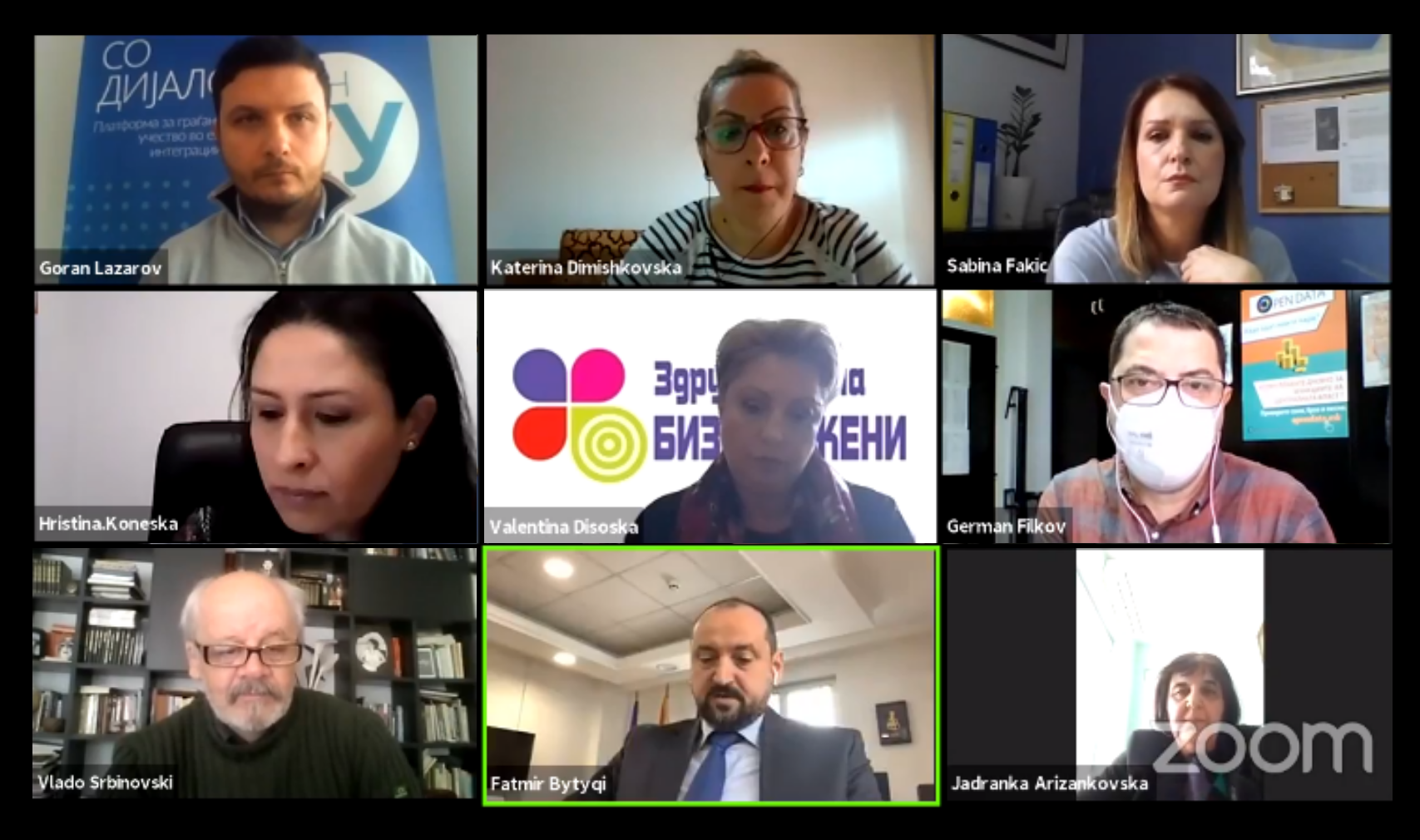Today, 12 March 2021, the project ”CSO Dialogue – Platform for Structural Participation in EU Integrations” organized online sector consultations around “Effects from Work of SWG Competitiveness and Innovation and Future Challenges for Improving Cooperation between Civil Society Organizations and Institutions”.
Goran Lazarov, Project Research Manager at the Foundation Open Society – Macedonia, presented overall goals of the project “CSO Dialogue – Platform for Structural Participation in EU Integrations”, and guidelines aimed at improving performance of all sector working groups. Lazarov referred to results from the survey conducted among 107 civil society organizations (CSOs) about their knowledge and participation in work of SWGs. According to survey data, only 9% of surveyed CSOs are represented in the sector working groups, 76% of them reported they have not made any contribution to work of these groups, while high 94% of CSOs expressed interest to participate in SWGs and contribute to programing IPA funds. These figures are indicative of the fact civil society participation in development of sector policies must be better coordinated and more comprehensive. In his introductory remarks, Lazarov underlined the commitment to revise the model for selection of civil society representatives, in cooperation with the Sector for European Affairs, by amending their respective rules of procedure. In that, sector working groups need to develop annual work plans in order to anticipate dynamics, documents and expectations from their work and need to respect the principle of transparency that underlines work of all sector groups. Hence, official website of the relevant line ministry needs to host news, documents, decisions and minutes from meetings held by this sector working group as method for information dissemination to all stakeholders.
Sabina Fakikj, Program Director at the Center for Civil Communications, presented key findings from the latest report on SWG competitiveness and innovation. In that, she reiterated that CSOs are not represented in this sector group, neither as members nor as observers, and that from the sector group’s establishment to present, there were no official initiatives for involvement of CSOs. Among the ranks of so-called “non-state actors”, members of this sector group include representatives from the chambers of commerce. Fakikj assessed that lack of civil society representatives in operation of this sector group, small number of meetings organized and low level of transparency and accountability had prevented this working group to become a functional mechanism for initiation of dialogue with all stakeholders, in order to improve the economy’s competitiveness and to increase productive investments. In regard to improving performance of this sector group, Fakikj referred to two key recommendations, as follows: to include representatives from civil society organizations under a transparent process of selection and to increase transparency in work of this sector group.
Deputy Prime Minister for Economic Affairs, Fatmir Bytyqi, stressed that SWG Competitiveness and Innovation is just one of many policy dialogue mechanisms, in addition to the Economic Council and the Platform for Public-Private Dialogue. Although he believes that civil society participation in the sector working group is secured with representatives from the chambers of commerce, he expressed preparedness to initiate a process for amending the sector group’s rules of procedure and to initiate a process for involvement of civil society organizations whose visions and missions overlap with objectives of this sector working group. Bytyqi does not believe that the underlying principles of transparency in operation of this sector group had been undermined, but acknowledge there is space for improvements and that actions will be taken in that regard.
Jadranka Arizankova from the Economic Chamber of RNM emphasized the importance of joint development of strategies aimed at increasing competitiveness because private companies are marked by low level of productivity and poor technology development. She called for increased number of sector group members by involving representatives from civil society organizations and the academia, and for increased number of sector group meetings.
Head of Department at the Secretariat for European Affairs (SEA), Hristina Konevska Berovska, assessed that the Government of RNM and SEA perceive civil society organizations as key partners in EU integrations. In her opinion, the role of civil society organizations in the past several years has been extremely important and visible through monitoring processes and providing constructive criticism, which stimulates and accelerates reforms, but also transparency and accountability of institutions. Berovska referred to the need for development of strong mechanism under which civil society organizations will nominate and select their representatives in all working bodies, including sector working groups, and that it is of particular importance for cooperation to be built on the basis of mutual trust.
This event was attended by more than thirty representatives from civil society organizations, state institutions, members of sector groups and the media.
This conference is organized as part of the project “CSO Dialogue – Platform for Structural Participation in EU Integrations”, coordinated and implemented by the Foundation Open Society – Macedonia, in partnership with Reactor – Research in Action, Eurothink – Center for European Strategies and Center for Civil Communications.
A video recording of the event is available on this link.
The full report on SWG Competitiveness and Innovation is available for download on this link.
